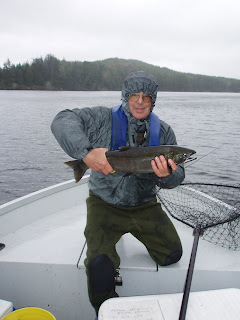
Hello Anglers,
Weather conditions over the past few days have made silver fishing on the lakes difficult. High winds made fly fishing impossible, and it was tough trolling too. We've had close to 5 inches of rain since Thu the 15th, which means once conditions allow, the lakes should be full of silvers.
Phil Gilman came up from California and fished with me for 3 days. We fly fished for silvers, with limited results. We only managed trout in tough conditions. Switching over to spinners, we had better success. We hooked several fish, landed jacks and trout, and landed a nice silver.
Here's this week's Siuslaw News story...
Trolling for Coho Salmon In the Lakes
Within the next few weeks, Coho salmon will start moving into Siltcoos and Tahkenitch Lakes in greater numbers. We here on the central coast are fortunate enough to have the only wild Coho fishery in Oregon. These fish are aggressive and easier to catch than their larger cousins (Chinook).
Why Trolling?
Trolling is the best way to cover water and increase your chances of finding aggressive fish. You constantly have your offering in the water and at the level where fish will find it. Trolling also puts your presentation down to the right depth quickly and efficiently.
Rods, Reels and Line
When trolling, consider using a medium action rod/reel combination spooled with 15 lb. test line. A medium action rod allows for good plug action and makes for a fun fight once a salmon is hooked. I use a 7 ft. rod so I can net the fish easily by myself. If you use a longer rod, it makes netting difficult. Levelwind or baitcasting reels are made for trolling. Attach a barrel swivel to the main line and attach 4 feet of lighter leader (10 or 12 lb. test). Again, lighter line (and tackle) allows for greater plug movement.
What Plugs To Use
While many different plugs and spinners work, I use Wiggle Warts™, Hot Shots™ and Brad’s Wigglers™ more than any other. I have a selection of colors including pink, orange, blue/silver, green/silver and silver. I recommend changing colors often to find the plug the fish are taking. In order to change plugs without re-tying, tie a locking snap or snap swivel on the end of your leader.
Where To Look for Fish
The first thing to do is look at a map of the lake you’ll be fishing. Notice the “arms” or coves of the lake into which tributaries drain. That’s where the salmon will eventually end up – they’re going to head up those tributaries to spawn. The salmon will mill around in these arms until enough rain falls to raise stream levels. On one lake, look for names such as Fiddle and Maple, and on another lake look for names like Five Mile and Leitel. These names will point you in the right direction.
Final Thoughts
Take a buddy or two fishing with you. You can run different plugs and find what the fish want. Another great location to find fish is in the lake adjacent to the outlet. All fish heading into the lake will be moving right past you (at some point). Try letting out 40-60’ of line when trolling. This will maximize the depth at which the plug will dive and keep you out of the weeds.
See you on the water,
Action Jackson
(Please send comments or questions to Action Jackson at 268-6944 or www.actionjacksonfishing.com)

